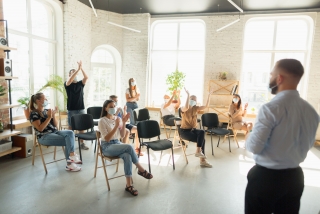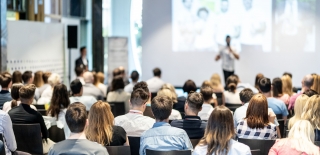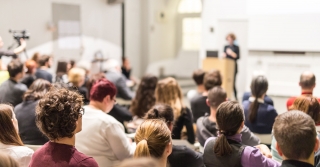The training needs of lecturers at today's universities
Neuropedagogy΄s project idea emerged from our consortium need to keep up with the needs and the challenges of today's changing world, in which also universities should not lag behind but cover those needs and meet any raised challenges.
Our core aim was to provide university lecturers with ideas/ methods based on Neuropedagogy on how to enrich their theoretical background but especially how to align their teaching methods with Neuropedagogy’s theorems. As a result of this enrichment, we target to propose a more enhanced teaching environment, which will drive university students to an effective and efficient learning process. Raising university lecturers’ qualifications in this area a proposed methodology, based on Neuropedagogy, would help them to follow the most state of the art teaching methodologies and tools in order to meet their students more advanced needs. Young people's expectations are related to the functionalities of the Information Communication Technologies (ICT), the efficient pedagogical utilisation of the new media, the proper time the students are able to spent in front of a screen to deal with their assignments, to alleviate the diversities and the variability of stimuli.
Therefore, the project partnership followed a mixed- research methodologic to explore university lecturers; knowledge on Neuroscience and Neuropedagogies effect on students learning and also to explore their teaching needs and how Neuropedagogy could provide them with the “tools” for a meaningful and time-effective learning results. A diagnostic survey was developed, setting a range of research indicators, well-related to neuroscience and its application in higher education. The indicators were grouped into research categories ,such as “communication and emotions” “concentration and engagement”, “teaching methodologies”, “creativity and critical thinking”, and “neuroscience and neuropedagogy”.
According the research analysis, a number of university lecturers training needs were identified, and Neuropedagogy’s consortium is able to proceed to the next stage of the project work, which is the design and development of an innovative training methodology and a practice guide based on Neuroscience.
Academic teachers' work depends on their ability to communicate effectively with their students and interact with them in meaningful dialogues. The way of conveying the content taking into account the change of narrative style, dynamics, avoiding monotonous style of speech are some basic aspects that meet lecturers’ training needs. By implementing appropriate communication techniques, they will feel comfortable to adapt new ideas, methods, techniques and relate them accordingly to their deep their knowledge ion their subject domain, enhancing students' interest, capturing their attentions and increasing their engagement, in the everyday teaching and learning process.
Moreover, research analysis has driven the researchers to the conclusion that university lecturers need support on how to use the emotions in their teaching practice process in order to arrange how to support their students’ feelings appropriately in the classroom for their learning benefit. An interesting piece of information is that more than 80% of the respondents agreed that emotions (both lecturers’ and students’) play an important role to the learning process. In addition, almost all of the respondents are convinced that a lecturer with high communication skills, emotional skills and empathetically skills, attracts students’ attention and interest . However, almost one third of the respondents are not convinced that they need to teach using emotions in their teaching process s they are not related with their subject domain. The research results indicate that even lecturers are aware about the usefulness of communication and emotions alignment, they do not apply their knowledge in their teaching practice.
Furthermore, according to the survey results, the vast majority of lecturers declare that they teach using examples based on students’ everyday experiences, practical case studies and real-life applications. However, at the same time, they acknowledge the term "associative memory" that indicates the same argument. Hence, it is considered advisable to include similar t that issues in the following training programme and relate this knowledge to student’s needs, reinforced the teaching and learning process with tangible data.
Equally important was considered from project’s consortium to focus on students' attention capacity and provide the needed knowledge to academics in order to use it affectively. After examining diagnostic assessment’s results, we realised that awareness on students attention varies , thus lecturers could better plan their lessons adapting such useful to them knowledge.
Besides, university lecturers need to enrich their knowledge with the most emerging methodologies such as gamification, flipped classroom and design thinking. These methods could increase students' involvement in the learning process, so for them to actively participate and interact, and to trigger their positive emotions helping them to remember useful information and being able to construct new knowledge and be innovative and critical as well.
For similar reasons, alternative types of assessment methods could be more suitable to university students interests and need. Lecturers are not always eager to implement new assessment methods, preferring traditional solutions, as they are more safe and tested than any new one. On the other hand, the vast majority of lecturers see positive reactions from students once they have decided to use such non-traditional methods. Commonly, increasing the knowledge of any available solutions could positively influence the ability to choose the most fitted assessment method to your students’ needs.
As a result of the ongoing research on the application of Neuroscience in Higher Education, the so challenging topic of "neuromyths" has raised researchers’ interest. It seems that neuromyths lead lecturers to misconceptions and thus not the best teaching practices, According to Jones (2014) the result of biased distortion and oversimplification of information obtained from the field of Neuroscience. These unscientific ideas are often associated with ineffective or non-evaluated teaching in the classroom, as a result Higher education lecturers should expand their knowledge on this topic.
Neuropedagogy project researchers, considering all the above mention research evidence, they are designing a an innovative training methodology and a good practice guide. based on Neuroscience. This is consortium’s next stage. The final stage will be the design and the development of an online platform through which the international community of academics will be able not only to learn about Neuropedagogy’s methodology, but also to use and reuse the developed materials and also to exchange opinions with other lecturers as members of an international academic community.
The full survey has been already uploaded in project website and it is translates in Spanish, Greek, Bulgarian, Polish and Dutch languages: https://www.neuropedagogy.eu/project-outputs .
The Neuropedagogy project (2020-1-PL01-KA203-081740) is implemented within the Erasmus + programme and funded by the European Commission. This publication reflects the views only of the author, and the European Commission cannot be held responsible for any use which may be made of the information contained therein.
The project partners are: Wyższa Szkoła Biznesu i Nauk o Zdrowiu - coordinator (Poland), Fundacion Universitat Jaume I-Empresa (Spain), Asociacion De Innovacion Emprendimiento Y Tecnologias De La Informacion Y La Comunicacion Innetica (Spain), University Of Ruse Angel Kanchev (Bulgaria), UC Limburg (Belgium), UC Leuven (Belgium), University of Panepistimio Patron (Greece).
The article is based on the Neuropedagogy IO1 report: " Studies on neuroscience applied to higher education and study to identify training needs." Source quoted in the article: Howard-Jones, P. A. (2014). Neuroscience and education: myths and messages. Nature Reviews Neuroscience, 15(12), 817-824.
The full list of sources is an integral part of the IO1 document (https://www.neuropedagogy.eu/project-outputs )



